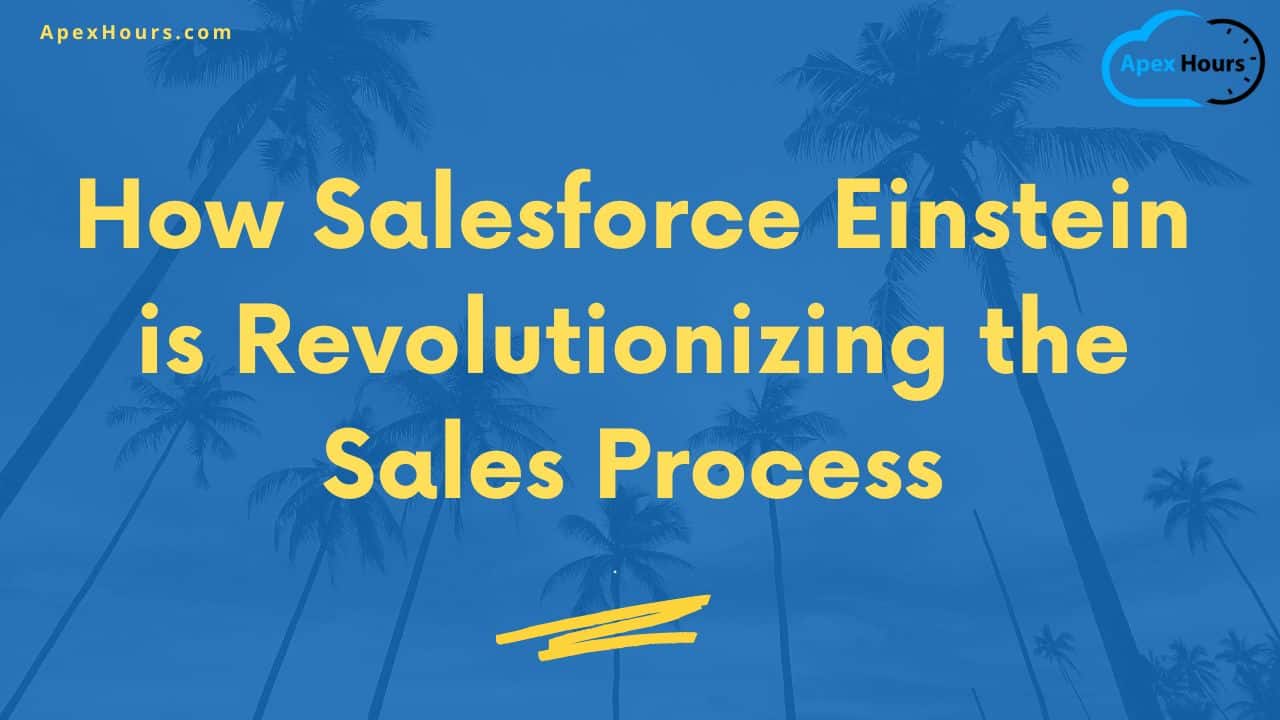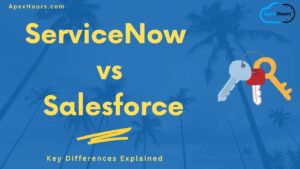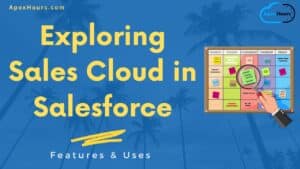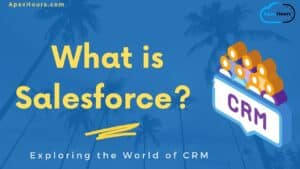Before the introduction of powerful CRMs like Salesforce, business processes were executed manually by employees and management. For each unique business process, a worker (or a team of workers) would have to spend time handling it. This time would be better spent on more important tasks. Let see How Salesforce Einstein is Revolutionizing the Sales Process
The influx of digital technologies such as Salesforce has helped to change this. Now, with the press of a button, files can be copied, stored, and transferred digitally, and reports can be created from digital data in just a few minutes. It is from these advancements that business process automation emerged.
Automation allowed business process-related tasks to be conducted without human resources being involved. It is important to note that business process automation is geared toward freeing up workers from having to handle time-consuming administrative tasks.
Artificial Intelligence has recently advanced the automation capabilities of Salesforce and other digital technologies. It makes automating sales, service, and marketing activities possible and can provide recommendations for what actions to prioritize. With sales leaders working to build data-driven sales organizations, Salesforce and AI are paving the way to making this possible.
The Salesforce AI Integration Was Inevitable
AI is a growing technology and something that is improving industries, businesses, and the entire sales process across the board. The Salesforce AI module: Einstein, is one of the first options integrated into a CRM.
Thanks to its predictive analysis, natural language processing, and machine learning, it is an unmatched technology that makes using Salesforce easier and more efficient. The AI technology used by Salesforce Einstein helps with sales, service, marketing, and more.
Because of the massive dataset available in Salesforce in combination with machine learning, predicting what customer is most likely to purchase a product is possible. This serves as a critical advantage for sales reps and marketers.
Frequently asked questions are used to create datasets a chatbot can access and answer customer questions in real-time. This helps to improve the overall customer experience, which benefits the sales process.
Einstein can also be used to present content to customers. It can improve the customer experience by predicting what content will be recognized by a user and ensuring this is what they see.
How Salesforce Einstein Is Transforming the Sales Process
Salesforce Einstein AI (discussed below) makes predictions, which enable you to boost your business and find the differences between closed and unclosed deals.
Using AI solutions for sales operations can help you determine if a buyer is less likely to purchase something and focuses on the promising leads while offering suggestions on how to close them.
The key benefits of using Salesforce Einstein in the sales process include the following:
- Close more deals. You can concentrate on selling while allowing AI to handle the “busy work.”
- Determine likely conversions. Einstein will access your sales history to develop scores that tell you what leads or opportunities will be most likely to convert. It can also prioritize the next moves you should take.
- Automatic synchronizing. Einstein AI can synchronize your email and calendar to Salesforce, which will help you save time on tedious data entry tasks.
- Provides intuitive insights. Automatic machine learning can predict your forecast and provide intuitive insights.
Now that you have a high-level understanding of what AI can do in Salesforce let’s explore further the benefits of Salesforce Einstein and how it works.
Improved Lead Prioritization and Conversion Rates
Behavioral and lead scoring is used to by Salesforce Einstein to predict what leads will likely convert. The factors that are used to create the behavioral and lead scoring model include the following:
- Behavioral analysis. Understanding how buyers interact with a company is essential to lead conversion. For example, someone who navigates to your pricing page is likely more interested in what you offer than someone who goes to the homepage and bounces off.
- Lead conversion history. Einstein looks at lead conversion history and uses lead metadata to create a model to score leads on a scale representative of conversion probability.
- Engagement. The frequency and level of engagement shown by a lead indicate how interested they are in what you offer. An example would be if someone subscribed to your newsletter. In this case, they are interested in engaging with you.
Unstructured data caused by a fragmented customer journey can result in you missing important elements that are invaluable to the sales process. With Einstein, optimizing the lead scoring models to ensure “hot leads” are at the top of your pipeline is possible.
Also, the AI algorithms used by Einstein will continue analyzing consumer behavior and adjust the lead scoring criteria as engagement changes.
With effective lead scoring, your sales pipeline is optimized and accelerated resulting in sales reps close more leads faster.
Personalize the Sales Strategy
You must know when to reach out to a prospect and what value proposition to use. This is just as important as knowing which leads to engage with.
For years, sales reps have used their instinct and experience to know when to engage with a prospect. With Einstein, actual customer data can be analyzed and used to create a strategy.
Even unstructured data, like minutes from sales meetings, social media posts, and emails, can generate information about customer sentiment.
When combined with the prospect’s competitor involvement, territory, annual revenue, and seniority of the decision makers, Salesforce Einstein can provide a clear path forward for sales reps.
Automated Data Capture Provides Better Insights
Salesforce (along with other CRMs) is good at collecting structured data; however, unstructured data is another story.
Since the information contained in unstructured data is so useful in developing customer insights, most sales reps will capture it manually, which is another time-consuming process.
Most businesses want their sales reps to spend time selling, not on data entry.
The Einstein Activity Capture feature automatically syncs calendar events and emails with the right prospects in Sales Cloud.
This virtually eliminates the data entry aspect of the job, resulting in increased productivity and – at some point – better sales. It is also effective in helping sales reps find sales information in real time since the data about a prospect is collated in a single location.
Improved Forecasting to Create an Optimized Sales Strategy
AI sales tools provide accurate forecasting, which improves decision-making in sales.
Sales teams can eliminate guesswork and predict the revenue they will generate by the conclusion of the forecasting period.
With Einstein Forecasting, your sales team can view sales trends (in real time) and how the team stacks up against them. All this is presented on an intuitive dashboard with graphics versions to ensure the information is understood.
Available Salesforce Einstein Tools Featuring NLP and ML
Let see How Salesforce Einstein is Revolutionizing the Sales Process. The main machine learning and natural language processing tools used by Salesforce Einstein include the following:
Einstein Discovery
This analytics tool provides users with relevant advice about customer engagement based on acquired customer data. With Einstein Discovery, you can gain insight into customer behavior, which can direct your sales efforts.
Einstein Next Best Action
With this tool, you get insight into if a customer still shows interest in what is being offered and what steps to take to keep their interest. For example, if the tool tells you to “email the new deal to them,” it means it is something that would interest them based on the data the tool has.
Einstein Prediction Builder
You can learn how likely a customer is to convert to a regular customer or if they want to continue. The prediction builder also provides likelihood queries.
Einstein Bots
These are advanced chatbots used to resolve frequently asked questions by customers. This saves a lot of time for users. Questions are updated automatically based on collected data.
Einstein Language
This tool only utilizes the natural language processing aspect of AI and is designed for sentiment analysis of customers. This is done by analyzing texts through email, chatbot, and other sources.
An example would be if a customer writes, “you are doing a good job.” Einstein notices this is an appreciation text and notifies the customer about the review section. It is a time-saving tool that analyzes customer responses automatically rather than manually doing all this.
Learn more about Salesforce Einstein GPT.
Salesforce and AI: A Winning Combo
Salesforce Einstein allows you to easily and quickly leverage the power of AI to help drive decision-making that ensures sales teams can achieve more with their time and generate more sales.
It will also drive increased revenues, improve the customer experience, and enrich the relationship between the sales team and your prospects.




